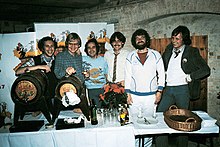
Back Shu-bi-dua Danish Shu-bi-dua NB Shu-bi-dua (группа) Russian Shu-bi-dua SIMPLE Shu-Bi-Dua Swedish
This article has multiple issues. Please help improve it or discuss these issues on the talk page. (Learn how and when to remove these messages)
|
Shu-bi-dua | |
|---|---|
 Shu-bi-dua in 1980 | |
| Background information | |
| Origin | Copenhagen, Denmark |
| Genres | Rock, Pop |
| Years active | 1973–2011 |
| Website | shubidua |
Shu-bi-dua (stylised as Shu•bi•dua) is a Danish pop group formed in 1973 in Copenhagen as an expansion of the group Passport. Throughout their 40-year history, Shu-bi-dua changed their lineup many times. Their lead singer, Michael Bundesen, was with the band throughout, except for a gap between 1984 and 1987. They have produced many well-known hits in Denmark, like Vuffeli-vov, Hvalen Hvalborg, Står på en Alpetop, Stærk Tobak (to the music from the Phil Medley and Bert Russell song Twist and Shout), Familien kom til Kaffe, Sexchikane, We wanna be free, and many more.
Their musical style owed much to folk and Central European schlager, but the core was always light rock. However, like "Weird Al" Yankovic, their musical styles could vary depending on the lyrics or the song. They are the Danish band with the most albums sold in Denmark, with more than 6 million as of 2022. Notable characteristics were word plays and humour, but also often with serious backgrounds - like sexual harassment, climate change, or life. In a YouTube video about the history of the band, Bundesen and Hardinger were asked at the end to name a song that represents the band best. Bundesen named "Den røde tråd" a comical but still autobiographical song about his development from working-class poverty to finding "your place in the sun." Even in the 2000s, the band got the audience to sing along with the first verse.